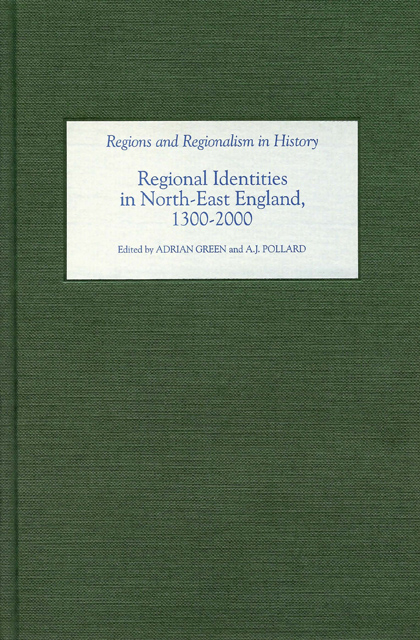Book contents
- Frontmatter
- Contents
- Foreword The AHRC Centre for North-East England History
- Dedication
- Contributors
- Preface
- Abbreviations
- Map
- Introduction Identifying Regions
- 1 North-East England in the Late Middle Ages: Rivers, Boundaries and Identities, 1296-1461
- 2 Borders and Bishopric: Regional Identities in the Pre-Modern North East, 1559-1620
- 3 Law in North-East England: Community, County and Region, 1550-1850
- 4 A Shock for Bishop Pudsey: Social Change and Regional Identity in the Diocese of Durham, 1820-1920
- 5 Business Regionalism: Defining and Owning the Industrial North East, 1850-1914
- 6 Competing Identities: Irish and Welsh Migration and the North East of England, 1851-1980
- 7 Immigrant Politics and North-East Identity, 1907-1973
- 8 Regionalism and Cultural History: The Case of North-Eastern England, 1918-1976
- Conclusion Conclusion Finding North-East England
- Index
5 - Business Regionalism: Defining and Owning the Industrial North East, 1850-1914
Published online by Cambridge University Press: 10 March 2023
- Frontmatter
- Contents
- Foreword The AHRC Centre for North-East England History
- Dedication
- Contributors
- Preface
- Abbreviations
- Map
- Introduction Identifying Regions
- 1 North-East England in the Late Middle Ages: Rivers, Boundaries and Identities, 1296-1461
- 2 Borders and Bishopric: Regional Identities in the Pre-Modern North East, 1559-1620
- 3 Law in North-East England: Community, County and Region, 1550-1850
- 4 A Shock for Bishop Pudsey: Social Change and Regional Identity in the Diocese of Durham, 1820-1920
- 5 Business Regionalism: Defining and Owning the Industrial North East, 1850-1914
- 6 Competing Identities: Irish and Welsh Migration and the North East of England, 1851-1980
- 7 Immigrant Politics and North-East Identity, 1907-1973
- 8 Regionalism and Cultural History: The Case of North-Eastern England, 1918-1976
- Conclusion Conclusion Finding North-East England
- Index
Summary
The North East has long been defined by its industrial profile. In the late nineteenth century it was the great stereotype of a coal, shipping and heavy-engineering industrial district, standing in contrast not only to England's agrarian shires, but also to other industrial clusters, such as the textile-manufacturing North West or the light-engineering and potterymaking Midlands. The staple industries dominate contemporary and historiographical perceptions of the North East, and of its place within wider processes of trade and industrialisation, whether in the sudden growth of the economy from the mid nineteenth to the early twentieth century, or in its equally dramatic collapse into ‘special area’ rustbelt subsequently. In addition, the export focus of the North East's major industries made it an important player in the broader industrialisation of Europe, while also increasing its vulnerability to events elsewhere.
If industry has been central to much historical writing on the North East, there has been less explicit engagement between that historiography and the regional question.Work on shipbuilding, to give just one example, is naturally focused on the industry itself, its workers, its wider significance to the economy and in many cases its local impact on particular waterfront communities. Such research is not intended to cast light on whether the shipyards helped make the North East a regional space, contributing to any sense of regional definition or belonging. Similar patterns are evident in the sizeable bodies of literature dealing with mining, shipping, chemicals and iron; while central to the popular image of the North East, the relationship between these industries and the North East's regional definition remains unclear.
Two threads in the economic historiography of British regions do have particular relevance to this essay. The first arose from discontent with the study of industrialisation at the level of the nation-state. Industrydeveloped in isolated clusters of activity in most countries, but the major collections of statistics available to the historian usually come from national treasuries and other central institutions of state.
- Type
- Chapter
- Information
- Regional Identities in North-East England, 1300-2000 , pp. 113 - 132Publisher: Boydell & BrewerPrint publication year: 2007



